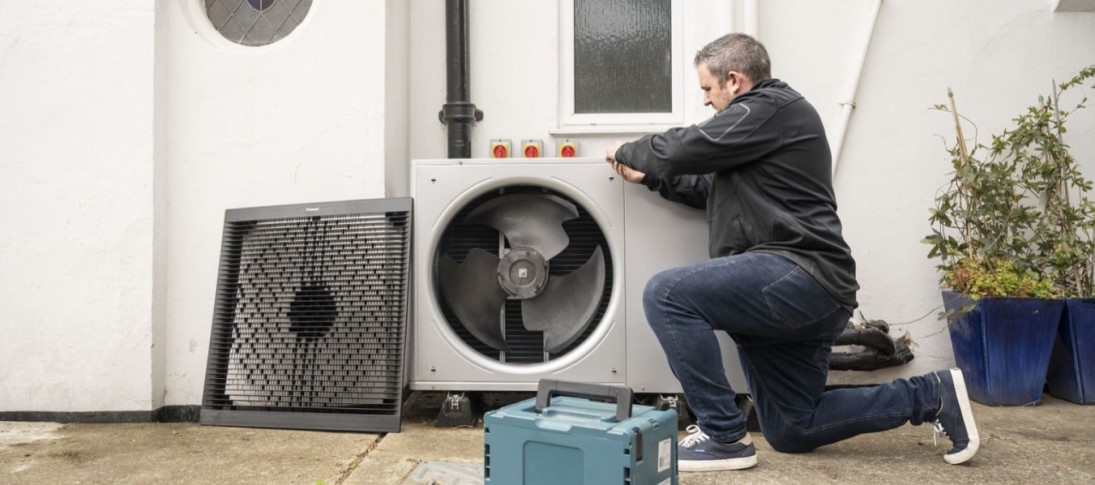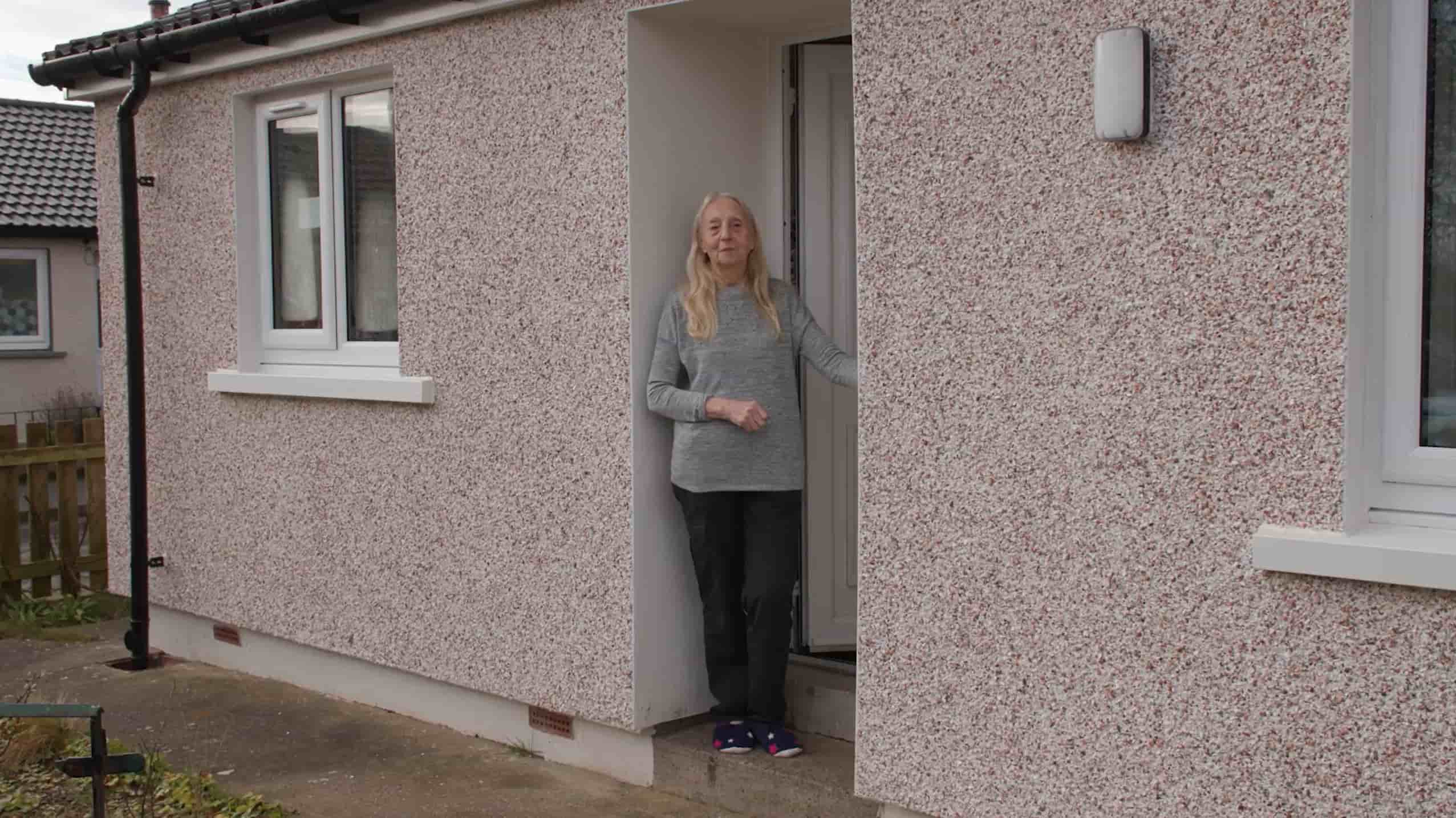Our purpose and strategy
Our purpose is Helping Britain Prosper.

How can social housing providers find the right balance between building new homes and retrofitting existing housing stock?

The UK is currently facing a housing crisis. There’s a chronic shortage of social homes, with nearly 1.5 million households on a waiting list for social housing in England, Scotland and Wales. At the same time, the UK has some of the oldest and worst insulated housing stock in Europe.
Since 2021 we’ve provided around £4 billion to accelerate sustainability ambition, including investment in making the UK's housing stock more energy efficient. However, more still needs to be done to both increase the supply of new social homes while urgently retrofitting existing stock to increase its thermal efficiency. This would not only help to reduce the UK’s carbon footprint, but could also bring about a better standard of living and improved health outcomes for social housing tenants.
Heat from homes currently accounts for around 16% of the UK’s total carbon emissions, and 35% of the total energy use. The UK Government has committed to upgrading as many homes as possible to meet an energy performance certificate (EPC) rating of C by 2035 ‘where cost-effective, practical and affordable’. By retrofitting social homes to make them more energy efficient, we can cut back on the emissions produced through energy consumption and get closer to meeting the UK Government’s Net Zero goals.
The Government initially pledged £3.8 billion through its Social Housing Decarbonisation Fund (SHDF) and announced an extra £1.25 billion for the fund in December 2023 - as part of a commitment to decarbonising the social housing sector. However, reports estimate that the social housing sector will require at least £36 billion more in investment, in addition to the £70 billion that the sector already plans to invest by 20503 to tackle decarbonisation and building improvements.
Lloyds Banking Group was an early adopter of the Sustainability Reporting Standard for Social Housing (SRS) – a framework for reporting performance against 12 environmental, social and governance (ESG) themes across 46 criteria.
Formulated by the industry to create a consistent and transparent framework for ESG reporting, the SRS framework has enabled organisations to effectively demonstrate their sustainability performance and strategies in a way that is consistent across the industry.
This consistency has helped give clarity to lenders and investors, as the SRS allows us to assess ESG performance, establish current baselines and measure subsequent improvements, in order to structure and deliver our ESG and sustainable finance solutions.
This framework can help Housing Associations deliver sustainable changes, as well as securing discounts on borrowing through ESG and sustainable finance as they demonstrate their progress against the framework.
Version 2.0 of the SRS was launched in October this year, following an extensive consultation period with key sector stakeholders. The updated version places even greater emphasis on the sector priorities, and particularly resident issues, with specific questions aimed at improving transparency around how adopters are dealing with the issues of damp and mould in the sector, along with questions around Net Zero targets and a greater focus on equality, diversity and inclusion.
The most recent update helps the sector keep pace with relevant international frameworks, making it easier for adopters to demonstrate their ESG credentials.
Through the evolution of ESG finance across the sector, and the wider adoption of SRS, we’ve deepened our client relationships beyond merely finance teams, with multi-layered discussions involving a range of teams across sustainability, asset management, and social and community impact to name a few. The SRS has been a catalyst for enhanced ESG reporting and has a crucial role to play in the continued growth of the sector for housing associations, investors and lenders alike.
Helping people access affordable, quality and sustainable homes is an important part of our purpose of helping Britain prosper.
While the transition to Net Zero is a good reason to retrofit homes, there is also significant social value in tenants having access to warm, high-quality homes – as well as for society as a whole.
Funding for houses may seem a separate issue to the pressures currently being seen in our health services, but in fact poor quality housing alone costs the NHS £1.4 billion a year1. In fact, research has shown that for every £1 spent on warming the homes of vulnerable people, we see a yield of £4 in health benefits.
As well as saving money for the NHS, research has also found that building more affordable housing could save the government £1.5 billion a year in costs relating to homelessness. Homelessness currently costs the government £6.5 billion a year, and a study by University College London (UCL) showed that building another 90,000 affordable homes a year would help the UK Government save money when it came to expenditure on housing and disability benefits, homelessness, and criminal justice service costs. It would also bring about potential longer term benefits in contributing to economic growth and higher productivity.
The benefits of retrofitting homes have been experienced across our social housing clients, including Home Group, who have recently retrofitted some of their properties near Cumbria. As a result of these works, some tenants have reduced the amount they have spent on bills from £7 per day to around £0.70. This is a hugely positive outcome for tenants, especially against the backdrop of today’s difficult economic climate.
Home Group secured a sustainability-linked loan with Lloyds Bank of £125 million in 2021, which will support their plans to build more than 1,000 homes a year. The credit facility includes financial and social targets, including enhancing the energy efficiency of its existing housing stock, and offering at least 120 apprenticeships a year.
Home Group is one of the UK’s largest suppliers of high quality housing. They’ve recently completed the first wave of retrofit on some of their existing housing stock, making their homes more carbon efficient, as well as bringing down bills and improving quality of life for their customers.

Despite a change in direction in some sustainability measures in the private housing sector recently announced by the Government, many Housing Associations still want to prioritise retrofit. Even though there currently isn’t regulation in place to compel housing associations to make improvements to their housing stock in England, we’re proud that many of our social housing clients are led by purpose.
We expect a consultation on the introduction of minimum energy efficiency standards (MEES) in the social housing sector that could set a statutory requirement for achieving an EPC C rating for social housing landlords by a certain deadline - however, many housing associations are already working towards a minimum of an EPC C rating for their existing properties , with new build at B, or in many cases A.
This is because they want to support their vulnerable residents, tackle fuel poverty, and bring about better outcomes for the people living in those homes. That’s why they are acting now, rather than waiting for regulation that tells them to.
Finding that balance is a delicate operation – both are important. The total number of new homes built in the UK in 2023 is forecast to be less than 150k - Significantly below the 300k ambition by Government, and whilst there is a clear national requirement to build new sustainable homes at pace and scale if we are to achieve our Net Zero ambitions, there is also an urgent need to accelerate the pace of retrofit of existing housing stock.
Of the 29 million homes in the UK, around 5 million are in the social housing sector. Whilst there are numerous challenges to delivering retrofit, improving the quality of existing homes has always been a core focus of housing associations.
The benefit for the tenants of improving the standard of the home and saving on fuel bills are obvious but in the longer run the housing association, and society more broadly, also benefit. The cost of retrofitting is significantly lower, and the pace of roll out significantly higher, than developing new homes. It is key that they run in parallel as we face into the climate emergency.
The average new-build property emits just one-third of the carbon of a typical older house as they are constructed using new technologies and materials, and built to ever evolving regulations. That’s a saving of 2.8 tonnes of carbon per year, per property, and we need to update older homes in line with this so that they are not both a carbon and financial drain.

Video | 1 min 34 secs
Queenie is a social housing tenant. Recently her housing association Home Group retrofitted her house. Find out what difference it’s made to her bills – and to her quality of life.
To help break down the barriers to retrofitting the UK’s housing stock, we need:
The skills gap also plays a big part in the technological drawbacks. It’s essential that we make sure we have the right skills in place not just for installation, but also for managing these technologies into the future. At the moment it’s easy to find someone to service a boiler – the same can’t yet be said for servicing a ground source heat pump. We need to build up the technology capability and the knowledge base within the UK at the same time.
As a headline sponsor of Regeneration Brainery, we’re looking to close the skills gap by supporting them to develop new industry talent. In 2022, over 4,000 young people went through the Regeneration Brainery programme, with around the same number expected to go through this year. The programme was set up with the view to boost diversity within the property industry, overcome the sector’s skills shortage, and provide young people from disadvantaged and diverse backgrounds with the skills, knowledge and connections they need to have thriving careers in the construction industry.
As we’ve seen, retrofitting plays a key role in achieving the UK Government’s Net Zero targets while also helping tenants improve their quality of life, as well as reducing their bills. This is especially important when considering the needs of vulnerable customers with low financial resilience – many of whom are social housing tenants.
At Lloyds Banking Group we‘ve been by the side of the social housing sector for decades and are committed to supporting the sector in their mission to provide access to quality and affordable housing to people and families across the UK. Since 2018, we’ve supported over £16 billion of funding to the sector and we currently work with over 300 housing associations of all sizes across the UK, from small local associations of several hundred homes to larger regional associations managing tens of thousands.
In 2022, we supported £2.1 billion of new funding, of which £1 billion related to sustainability improvements, including retrofit investment and the decarbonisation of social homes, which has reduced tenants’ energy bills and helped to tackle fuel poverty.
However, to meet the challenges around the energy efficiency of UK’s existing housing stock, we need to continue to effectively support housing associations and housebuilders in bringing about the needed improvements to existing homes, as well as to continue to build new high-quality, energy efficient properties. Our role is to work closely with our clients to support them in striking the right balance between building new homes and improving existing stock, to bring about the best outcomes for social housing tenants, and to help Britain prosper.

Managing Director & Head of Housing
David is a Managing Director with responsibility for Lloyds Banking Group’s relationships with clients in the house building and social housing sectors. Having joined Lloyds Bank in 1989, David undertook numerous roles across Retail and Commercial Banking before joining the Capital Markets division in 2000. David was instrumental in the development of the Bank’s Capital Markets business in both the public and private debt markets in the UK, USA and Europe. In January 2017, David returned to relationship banking to create a new team with responsibility for UK Housing.
David has a passion for sustainability and in 2021 became a Board director of Sustainability for Housing Ltd and joined the Executive Committee of NextGeneration, both of which focus upon developing sustainability reporting standards and frameworks in the rental and new build markets. He also supports Regeneration Brainery which focuses on the putting the S in ESG.
David is ACIB qualified and has a first class honours degree in Financial Services from The University of Manchester.
1. How poor housing costs the NHS £1.4bn a year (thetimes.co.uk)
2. Building more affordable housing could save the government £1.5bn a year (Inside Housing)
3. Decarbonising housing associations’ homes to cost £36bn (Savills)

Becky Heaton | 18 Sep 2023
How can greener homes improve our quality of life while still cutting down on the UK’s carbon emissions?

Charlie Nunn | 02 Nov 2022
How Lloyds Banking Group is helping Britain prosper by supporting the UK’s vital social housing sector.

David Cleary | 13 Dec 2022
As the cost of living continues to rise, it's vital that social housing is well maintained to help support people and families across the UK.